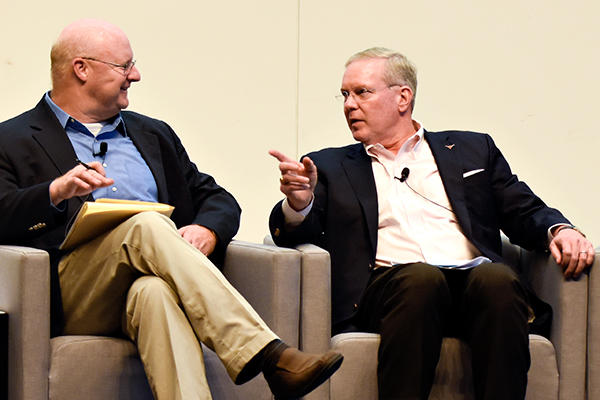A former defense department officer outlined the complications with implementing efficient business strategies at the Pentagon and the importance of communicating with Congress at a talk Monday.
The McCombs School of Business, the Strauss Center and the Clements Center hosted the conversation with Jay Gibson, a UT alumnus who worked in private industry and held many governmental positions, including chief management officer of the United States Department of Defense.
During the talk moderated by William Inboden, public affairs associate professor, and law professor Robert Chesney, Gibson said it is difficult to understand how the Department of Defense operates.
“It’s an artifical environment,” Gibson said. “It’s one of a kind — the culture, the structure, the governance, down to resourcing and budgeting. The way that takes place is very, very unique.”
Gibson said there are few commonalities between the Pentagon and the private sector. When implementing changes in the private sector, he said their effectiveness can be measured financially. By contrast, the implementation of efficient practices doesn’t always line up with the mission of the defense department, Gibson said.
“In the Department of Defense, our mission is to maintain national security by dealing with those that would threaten us,” Gibson said.
However, Gibson said there are some business practices that can be adopted when trying to enact change. When he worked for the defense department, he said he frequently communicated with influencers on congressional committees like he would communicate with a board of directors.
“You want that relationship that only comes from being proactive, transparent, honest and communicating,” Gibson said.
Business graduate student Jonathan Powell served in the Army and said he echoed the sentiment that better practices could be implemented to make the military more efficient. He said his military past ties into his interests as a student.
“Anything I could possibly do to make the experience of soldiers more effective, efficient or comfortable, that would be something I would be extremely interested in,” Powell said.
Public policy doctoral student Ryan Kendall said he researches how militaries adapt to destructive technologies. He said the talk was impactful because he got to hear from someone with practical policy experience.
“What struck me, from his perspective as a businessman and a practitioner, is just how the department of defense takes this innovative spirit (and) unleashes it, but within the bounds and constraints of legislative law and existing policy,” Kendall said.





















